
The world has been so upside down for so long that it’s hard to reconcile what “normal” even is anymore … if there ever was a “normal” in the first place. For my family, Thanksgiving wasn’t really much about turkey (vegetarianism tends to hamper the typical American holiday diet) or large gatherings (if you met my extended clan you’d understand). Rather, we typically were cloistered away in the dark comfort of the cineplex – sometimes taking in as many as three movies in a row, much to the chagrin of my father’s aching back and wallet. Tickets are expensive enough, but you’ve never seen us hit that concession stand!
2021 has been rough. It hasn’t been the sweet relief from 2020 all had hoped it to be. I lost my beloved mother, but her spirit is with me every day. I’ve lost track of what letter of the Greek alphabet this virus and its endless variants have adopted as nomenclature. I feel sadder and fatter and more exhausted than ever in my life. There have been bright spots, sure, but I feel myself aching for the mundane joys of life circa 2019 (and earlier) more and more.

Hell, writing this blog entry is both comforting and daunting. I crave the click of the keys under my fingers, barely keeping pace with the popcorn thinking in my addled brain. Yet, I also feel like someone has asked me to enter an Olympic pole-vaulting competition as I stare at this blank screen.
My wonderful dad and I started some new traditions this year, with an eye toward our past. We met up with new pals for lunch (try the Lucky Moose/Turtle if you’re in Fort Wayne, Indiana – wonderful atmosphere and service and a menu that goes on for days, including many veg-friendly options), and we rekindled some longstanding friendships (Phyllis and Scott Gates are lovely, loving, lively hosts with a cocktail and appetizer array that deserves a Michelin star). And, yes, we finally got back into the movie theatre, safely masked and distanced with hand sanitizer at the ready. We skipped the concession line, though, for multiple and obvious reasons, and my father’s wallet breathed a sigh of relief.

We caught up with three marvelous films over the holiday. As I have the unfortunate habit of forcing patterns that may or may not actually exist on random collections, it was clear, at least to me, that King Richard, Belfast, and House of Gucci – taken together – explore, dissect, and celebrate the power of family – the good, the bad, the ugly, the essential, and everything in between.

King Richard covers the developmental years of tennis aces Venus and Serena Williams and the fierce commitment of their parents Richard and Brandi. This is Will Smith’s best work in years as he imbues Richard with a haggardly leonine focus that walks the fine line between Great Santini-esque obsession and Mister Rogers’ “you can do anything as long as you’re having fun” positivity. I guarantee you’ll never look at tennis shorts and knee-high athletic socks the same way again!
Aunjanue Ellis is an understated marvel as mom Brandi, a fine counterpoint to Richard’s relentless push, filling in the humanity where Richard’s parenting falls short. Jon Bernthal is a delight as endlessly exasperated yet mindfully hopeful coach Rick Macci. His Dorothy Hamill-ish bob deserves an Oscar. The film – never a bore and consistently entertaining – ends where it should, at the beginning of Venus’ pro career and offers unassailable proof of the foundation to success that involved parenting provides.

In Kenneth Branagh’s semi-autobiographical Belfast, the parents play a similar yin-yang role in their children’s lives. Jamie Dornan (shedding all the ooky kink of his Fifty Shades of Grey days) and Caitriona Balfe are on the razor’s edge of heartbreak, their idyllic neighborhood torn asunder by the Protestant/Catholic “troubles” in Northern Ireland in the late 1960s. The push-pull of Maslow’s hierarchy of needs hangs over the picture, as Dornan’s character urges the family to leave for greener pastures, and Balfe struggles with her husband’s profligacy and not losing the creature comforts of family and friends sharing child-rearing duties.
Judi Dench and Ciaran Hinds are akin to a warm, woolen, slightly scratchy blanket as Dornan’s ever-present parents, and Jude Hill is a luminous find as the young protagonist Buddy, golden child of the family. Filmed in lush black and white, the film is a throwback to coming of age fables set against the backdrop of cultural turmoil like To Kill a Mockingbird, at times a bit too artsy for its own good, but leaving the viewer with a poignant, optimistic gut punch as the family finds its legs again.

“These are your ghosts. Not mine,” Maurizio Gucci (a compelling Adam Driver deftly balancing giddy nebbishness and aloof austerity) declares to his father, Gucci fashion empire scion Rodolfo (a miscast Jeremy Irons, desperately in search of an Italian accent by way of Downton Abbey), a spectre who lives hopelessly in the past. Ridley Scott’s fizzy, haunting House of Gucci exposes the dark underbelly of family survival: love and admiration that curdles into resentment and maneuvering. Much has been written (unfairly) about the film and its script, claiming it’s a loose amalgamation of riffs last seen on Dynasty and Dallas. Hogwash. That isn’t to say there isn’t plenty of escapist disco-era glitzy materialistic fun to be had, though.
And, no, Lady Gaga – who is incredibly nuanced and infinitely watchable as Maurizio’s ambitious, brilliant, tortured wife Patrizia – does not sound like Natasha of Bullwinkle fame. I was fine with the accents and mannerisms throughout the cast, Lyons notwithstanding. Italia! (I’ve never seen so many cigarettes smoked or espressos drunk in my life.) Pacino is in fine form as swaggering yet bedraggled Aldo Gucci, and a thrillingly unrecognizable Jared Leto is heartbreaking comic relief as Aldo’s dingbat-yet-deeply-misunderstood child Paolo.
But the star of the show is Gaga – she continues the stunning movie star path she began in A Star is Born, commanding the screen like Liza Minnelli or Susan Hayward, vibrating with the fiery frustration of a woman who knows the way ahead but can’t quite reach past the male egos around her. Like Liza, her eyes can flare from limpid to enraged in a nanosecond. I’d watch her read the phone book at this point.
Family defines us, shapes us, inspires us, frustrates us, comforts us. These three films unpack in beautiful form how one reconciles individuality in the face of such influence. Highly recommend them as a triple feature. Popcorn, candy, and soda pop optional.

Holiday postscript … in the spirit of new traditions
LINK TO FULL PHOTO ALBUM: https://lnkd.in/e_A5CyUM … It’s the hap-happiest season of all. In part because I sort of dust for once in anticipation of putting up our mammoth tree, at which time I spend HOURS nestling what seems like 1,000 ornaments amidst its branches. I know some might go for aesthetics or theme in their holiday decor. But we’re not much on restraint. No, we go for nostalgia.
Every well-loved, slightly tired knickknack or ornament we unearth reminds us of happy times – and a few not-so-happy – but all essential. Yes, John and I have ordered a personalized stocking for Hudson (on its way). And, no, we don’t want to think about packing all this holly jolly away in a little over a month. We shall just enjoy the season as the world spins nuttier and wilder every day.
And thanks, Don and Corinne, for this nifty shirt from Sechler’s Pickles, Inc., reputedly the purveyors of Frank Sinatra’s fave gherkin. Alas, Frank didn’t accompany today’s festive shenanigans – but Jennifer Nettles, Kylie Minogue, and Taylor Swift kept us humming (and singing) along. Happy holidays!
And thank you, Lori, Andrew, and Gabby – between you all and my mom Susie, you account for about 90% of those thousand ornaments on our tree! ❤️

And shameless self-promotion post-postscript …
THIS THURSDAY AT 3 PM ET …
Facebook: https://www.facebook.com/155057871244919/posts/4648251118592216/?d=n
YouTube: https://www.youtube.com/watch?v=YB7GvGtRrX0
LinkedIn: https://www.linkedin.com/video/event/urn:li:ugcPost:6871173503022964736/
Legal Marketing Coffee Talk is back this Thursday to kick off December with host Roy Sexton and his guest, Scott Lawrence, the man responsible for Roy’s professional headshots. Did you know that Roy moonlights as a superhero? He has the headshot to prove it, thanks to Scott!
Roy and Scott will talk about the fine art of personal and professional branding and how having a range of headshots is essential in this glittering age of digital marketing. Different audiences require different looks and styles to create lasting engagement.
Scott observes, “I believe people hire people, so you must use a professional image that reflects who you really are. … I’m a headshot photographer with a business background. Get noticed with an authentic professional headshot. Leave your selfies behind. I work with individuals in customized sessions. We discuss your personal brand and craft an image that sends just the right message to your followers – both professional and personal. I also help large organizations to properly highlight their people – the most valuable asset.”
Join us Thursday, December 2nd at 3 PM ET right here on Facebook
Legal Marketing Coffee Talk is brought to you by: By Aries and Kates Media.



 I had a pretty gluttonous Thanksgiving. No, I don’t mean green bean casserole and pecan pie (I loathe pumpkin) and cranberry sauce and corn bread stuffing. I certainly don’t mean turkey. As Tom Hanks, thoughtfully portraying children’s TV icon Fred Rogers, observes in the surreally superlative A Beautiful Day in the Neighborhood, “I just can’t imagine eating anything that has a mother.“ Me neither.
I had a pretty gluttonous Thanksgiving. No, I don’t mean green bean casserole and pecan pie (I loathe pumpkin) and cranberry sauce and corn bread stuffing. I certainly don’t mean turkey. As Tom Hanks, thoughtfully portraying children’s TV icon Fred Rogers, observes in the surreally superlative A Beautiful Day in the Neighborhood, “I just can’t imagine eating anything that has a mother.“ Me neither. It really is kind of a shame (and the luck of the draw) that I devoted 12 (!) paragraphs to
It really is kind of a shame (and the luck of the draw) that I devoted 12 (!) paragraphs to  A Beautiful Day in the Neighborhood is exceptional, in great part because the cast – the aforementioned Hanks, Matthew Rhys as a hardened journalist determined to find the toxic truth underlying Mr. Rogers’ sunny sanctimony, and Chris Cooper as Rhys’ neglectful/neglected papa – sidestep any mawkishness inherent in the material with their honest, unadorned portrayals. More to the point, director Marielle Heller takes her cue from the source material – an Esquire cover story – turning in a film that is more clear-eyed essay than slice-of-life biopic. Everything in the movie feels as slightly left of center as any episode of Mr. Rogers’ Neighborhood ever did, acknowledging the program’s twee sensibilities and refracting the show’s heightened sense of “make believe” wonder as a metaphorical context for the tiny cruelties family and friend exact on a daily, perhaps hourly basis. It’s a good movie, not quite a great one, but the comforting cinematic equivalent of a scruffy, slightly embarrassing cardigan and pair of house shoes.
A Beautiful Day in the Neighborhood is exceptional, in great part because the cast – the aforementioned Hanks, Matthew Rhys as a hardened journalist determined to find the toxic truth underlying Mr. Rogers’ sunny sanctimony, and Chris Cooper as Rhys’ neglectful/neglected papa – sidestep any mawkishness inherent in the material with their honest, unadorned portrayals. More to the point, director Marielle Heller takes her cue from the source material – an Esquire cover story – turning in a film that is more clear-eyed essay than slice-of-life biopic. Everything in the movie feels as slightly left of center as any episode of Mr. Rogers’ Neighborhood ever did, acknowledging the program’s twee sensibilities and refracting the show’s heightened sense of “make believe” wonder as a metaphorical context for the tiny cruelties family and friend exact on a daily, perhaps hourly basis. It’s a good movie, not quite a great one, but the comforting cinematic equivalent of a scruffy, slightly embarrassing cardigan and pair of house shoes. Jojo Rabbit takes the Merrie Melodies lunacy of actor/director Taika Waititi’s
Jojo Rabbit takes the Merrie Melodies lunacy of actor/director Taika Waititi’s 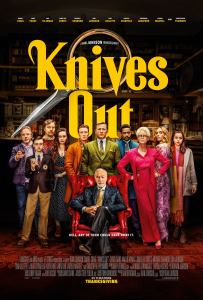 Knives Out is just ok. There are far better versions of this movie and far worse, but I think I’d rather spend an afternoon with Sleuth or Murder by Death, hell, even Deathtrap before giving Knives Out another go. As Daniel Craig, playing a crispy-fried Foghorn Leghorn private detective with none of the zingy Mason-Dixon daffiness he exuded in
Knives Out is just ok. There are far better versions of this movie and far worse, but I think I’d rather spend an afternoon with Sleuth or Murder by Death, hell, even Deathtrap before giving Knives Out another go. As Daniel Craig, playing a crispy-fried Foghorn Leghorn private detective with none of the zingy Mason-Dixon daffiness he exuded in  Blinded by the Light (on DVD and streaming) is directed with a sure hand by Gurinder Chadha, employing pretty much the exact same template she rode to international success with Bend It Like Beckham (which in and of itself follows the pattern of so many working class British dramedies like Billy Elliot or The Full Monty, depicting resourceful souls rising above class warfare). If it ain’t broke, don’t fix it. Based on a true story, the film focuses on a young Pakistani man (an appealing turn by Viveik Kalra) who strives to overcome the racist nationalism (there’s that theme again!) and economic disparity of 1980s Thatcherite England and to break loose from a well-intentioned but overbearing father who can’t understand his boy’s dreams of becoming a writer. (“Where’s the money in that?!” asks this guy writing a movie blog for free.) Instead of soccer, our protagonist finds his muse in the lyricism of “The Boss” Bruce Springsteen, encouraged by a wry but loving literature teacher (a marvelous Hayley Atwell) and some beautifully drawn teenage pals (Aaron Phagura and Nell Williams). The film is as predictable as all great fables can be but is delicately executed, well-acted, and simultaneously sobering and inspiring. And, yes, this bonbon of a film seems ready-made to be musicalized.
Blinded by the Light (on DVD and streaming) is directed with a sure hand by Gurinder Chadha, employing pretty much the exact same template she rode to international success with Bend It Like Beckham (which in and of itself follows the pattern of so many working class British dramedies like Billy Elliot or The Full Monty, depicting resourceful souls rising above class warfare). If it ain’t broke, don’t fix it. Based on a true story, the film focuses on a young Pakistani man (an appealing turn by Viveik Kalra) who strives to overcome the racist nationalism (there’s that theme again!) and economic disparity of 1980s Thatcherite England and to break loose from a well-intentioned but overbearing father who can’t understand his boy’s dreams of becoming a writer. (“Where’s the money in that?!” asks this guy writing a movie blog for free.) Instead of soccer, our protagonist finds his muse in the lyricism of “The Boss” Bruce Springsteen, encouraged by a wry but loving literature teacher (a marvelous Hayley Atwell) and some beautifully drawn teenage pals (Aaron Phagura and Nell Williams). The film is as predictable as all great fables can be but is delicately executed, well-acted, and simultaneously sobering and inspiring. And, yes, this bonbon of a film seems ready-made to be musicalized.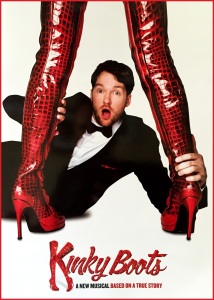 Speaking of which … Kinky Boots, the Tony-winning musical adaptation by Cyndi Lauper and Harvey Fierstein of the 2005 Brit comedy film of the same name (which starred a then-unknown Joel Edgerton and Chiwetel Ejiofor), was just broadcast on PBS’ Great Performances. To say the show was perfection – as perfectly kicky as the thigh-high red boots drag queen Lola (and later the entire cast) dons during the show – would be the textbook definition of understatement. This cast was the Olivier Award-winning West End crew, led by Matt Henry (my mother accurately observed … move over Shirley Bassey and Lena Horne) as the transformative Lola who storms into the life of bedraggled shoe-factory scion Charlie (a winning Killian Donnelly) and turns a small town on its collective head … for the better. The factory is days away from closing, and, by reinventing itself to serve the “niche market” of drag queen footwear, changes its fortunes … and the lives (and attitudes) of all who work there. This is no To Wong Foo magical drag queen fairy tale, however. Lola (also known as Simon) is a fully realized, poignant, exhilarating human being, complex, complicated, flawed, perfect. In Henry’s manicured hands, Lola is the heart of the show, a beautiful yin to Charlie’s shaggy yang. The stage relationship between Donnelly and Henry is deeply affecting, propelled by Lauper’s pulsing, percolating, nicely integrated score. Amy Lennox as Charlie’s co-worker, confidante, and eventual love interest Lauren is dynamite, a musical comedy crackerjack, balancing pathos and hilarity brilliantly, sometimes in a single phrase. Kinky Boots celebrates accepting who we are (and the gifts which embracing that truth can bring) with warmth, kindness, and about the best pacing I’ve seen onstage.
Speaking of which … Kinky Boots, the Tony-winning musical adaptation by Cyndi Lauper and Harvey Fierstein of the 2005 Brit comedy film of the same name (which starred a then-unknown Joel Edgerton and Chiwetel Ejiofor), was just broadcast on PBS’ Great Performances. To say the show was perfection – as perfectly kicky as the thigh-high red boots drag queen Lola (and later the entire cast) dons during the show – would be the textbook definition of understatement. This cast was the Olivier Award-winning West End crew, led by Matt Henry (my mother accurately observed … move over Shirley Bassey and Lena Horne) as the transformative Lola who storms into the life of bedraggled shoe-factory scion Charlie (a winning Killian Donnelly) and turns a small town on its collective head … for the better. The factory is days away from closing, and, by reinventing itself to serve the “niche market” of drag queen footwear, changes its fortunes … and the lives (and attitudes) of all who work there. This is no To Wong Foo magical drag queen fairy tale, however. Lola (also known as Simon) is a fully realized, poignant, exhilarating human being, complex, complicated, flawed, perfect. In Henry’s manicured hands, Lola is the heart of the show, a beautiful yin to Charlie’s shaggy yang. The stage relationship between Donnelly and Henry is deeply affecting, propelled by Lauper’s pulsing, percolating, nicely integrated score. Amy Lennox as Charlie’s co-worker, confidante, and eventual love interest Lauren is dynamite, a musical comedy crackerjack, balancing pathos and hilarity brilliantly, sometimes in a single phrase. Kinky Boots celebrates accepting who we are (and the gifts which embracing that truth can bring) with warmth, kindness, and about the best pacing I’ve seen onstage. Lady & the Tramp (currently streaming on Disney+) is on the small screen where I reckon all of these live action remakes of Disney’s animated classics actually belong. Seriously, 20 years ago, these things would have all been very special presentations on Sunday nights on The Wonderful World of Disney in order to sell theme park tickets before landing on well-worn VHS tapes in the back seats of mini-vans everywhere. That said, this latest re-do ain’t half bad. Lady (voiced with moxie by Tessa Thompson) has an agency she never had in the animated film, and Tramp (a winsome Justin Theroux) just seems less, well, skeezy. There is an overarching effort toward inclusiveness with color-blind casting for the human roles of Jim Dear and Darling that, on one hand, is really refreshing, but on the other creates an inadvertently weirdly white-washed message about what interracial couples would have actually endured in turn-of-the-20th-century Missouri. And the problematic “Siamese Cat Song,” ear-wormy as it may have once been, is officially retired. In its place, there is a new and perfectly acceptable ditty to accompany Aunt Sarah’s prized felines’ narrative-essential shenanigans. “He’s a Tramp” is still on the playlist, but this time around is performed with sassy aplomb by Janelle Monae, in the role originated by Peggy Lee. The film is entertaining and pleasant with a timeless message about, yes, accepting our differences … not to mention the importance of responsible pet ownership.
Lady & the Tramp (currently streaming on Disney+) is on the small screen where I reckon all of these live action remakes of Disney’s animated classics actually belong. Seriously, 20 years ago, these things would have all been very special presentations on Sunday nights on The Wonderful World of Disney in order to sell theme park tickets before landing on well-worn VHS tapes in the back seats of mini-vans everywhere. That said, this latest re-do ain’t half bad. Lady (voiced with moxie by Tessa Thompson) has an agency she never had in the animated film, and Tramp (a winsome Justin Theroux) just seems less, well, skeezy. There is an overarching effort toward inclusiveness with color-blind casting for the human roles of Jim Dear and Darling that, on one hand, is really refreshing, but on the other creates an inadvertently weirdly white-washed message about what interracial couples would have actually endured in turn-of-the-20th-century Missouri. And the problematic “Siamese Cat Song,” ear-wormy as it may have once been, is officially retired. In its place, there is a new and perfectly acceptable ditty to accompany Aunt Sarah’s prized felines’ narrative-essential shenanigans. “He’s a Tramp” is still on the playlist, but this time around is performed with sassy aplomb by Janelle Monae, in the role originated by Peggy Lee. The film is entertaining and pleasant with a timeless message about, yes, accepting our differences … not to mention the importance of responsible pet ownership.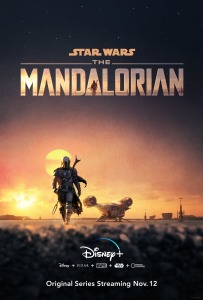 The Mandalorian (currently streaming on Disney+) is about the best Star Wars spin-off to come from LucasFilm in the past 20-some years (if ever), in great part because it doesn’t seem very Star Wars-y. Or at least what “Star Wars-y” has come to mean since the original trilogy debuted: needlessly complicated back story; self-serious and ponderous mythologizing; overlong playing time; character development that seems driven as much by merchandisability as narrative need. The Mandalorian by comparison is a breezy pleasure, a throwback to single-protagonist vintage TV Westerns like The Virginian or The Rifleman (without any intentional swagger/machismo or inadvertent misogyny/racism), wherein our reluctant protagonist becomes the lens through which a different 37-minute parable is told each week. Oh, and there’s a really adorable Baby Yoda, who may be the cutest, funniest creature dreamed up since the Ewoks (yes, I still like Ewoks). Producer/writer Jon Favreau joyfully wears his retro influences on his sleeve (as evidenced by the minimalistic percussive soundtrack and the closing credits sequence, both of which seem channeled straight from 1968). Leading man Pedro Pascal (face forever obscured under his signature bounty hunter helmet – “this is the waaaay“) conveys so much heart, great comedic timing, and an intriguing amount of agnosticism, without benefit of one. single. facial. expression. Four episodes in, and I can’t wait to see where this one is going.
The Mandalorian (currently streaming on Disney+) is about the best Star Wars spin-off to come from LucasFilm in the past 20-some years (if ever), in great part because it doesn’t seem very Star Wars-y. Or at least what “Star Wars-y” has come to mean since the original trilogy debuted: needlessly complicated back story; self-serious and ponderous mythologizing; overlong playing time; character development that seems driven as much by merchandisability as narrative need. The Mandalorian by comparison is a breezy pleasure, a throwback to single-protagonist vintage TV Westerns like The Virginian or The Rifleman (without any intentional swagger/machismo or inadvertent misogyny/racism), wherein our reluctant protagonist becomes the lens through which a different 37-minute parable is told each week. Oh, and there’s a really adorable Baby Yoda, who may be the cutest, funniest creature dreamed up since the Ewoks (yes, I still like Ewoks). Producer/writer Jon Favreau joyfully wears his retro influences on his sleeve (as evidenced by the minimalistic percussive soundtrack and the closing credits sequence, both of which seem channeled straight from 1968). Leading man Pedro Pascal (face forever obscured under his signature bounty hunter helmet – “this is the waaaay“) conveys so much heart, great comedic timing, and an intriguing amount of agnosticism, without benefit of one. single. facial. expression. Four episodes in, and I can’t wait to see where this one is going.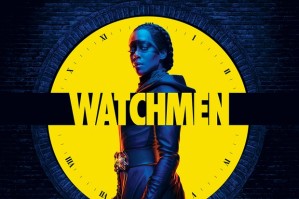 Watchmen (HBO) is so damn good. We had one of those “watch HBO for free!” weekends on Xfinity and, in a less than 24-hour period, we binged the first seven episodes, including tonight’s exemplary “An Almost Religious Awe” (every episode has a great title). I’m going to have to show up on the doorstep of some generous HBO-subscribing friend the next two Sundays to see how this thing wraps up! Any takers? The original DC comic book mini-series (1986-87) deconstructed the very notion of what a superhero was, offering a heady mix of cynicism and optimism, critical of Reagan-era excess and territorialism while satirically reinventing atomic age tropes of flying humans and hooded marvels, all to dissect the morals and ethics of those who set themselves up as our saviors. “Who watches the Watchmen?” Subsequent efforts to adapt the landmark series onscreen (no thank you, Zack Snyder) or revisit in print (just stop, Geoff Johns) have fallen flat, missing the existential trauma at the heart of the work. If you’d told my 14-year-old self that his 46-year-old future would include a triumphant, accessible yet layered, televised continuation of the storyline for a mainstream audience, I never would have believed you. In fact, it is this very question of identity and self and the ephemeral nature of time folding upon itself through memory that gives Watchmen its slippery power. The HBO series replaces the Cold War paranoia of the original comics with an incisive take on the race-baiting xenophobia currently paralyzing our country, in a way that is completely true to the original work while acknowledging how far we have (and haven’t) come as a society. Regina King and Jean Smart are (together) an acting powder keg, wrestling with thorny questions of race and gender, empowered and stonewalled and uninhibited and numb with white-hot rage. The supporting players are to a one excellent – Don Johnson (again!), Tim Blake Nelson, Jeremy Irons, Louis Gossett Jr., Hong Chau, Frances Fisher, Tom Mison, Sara Vickers – finding Shakespeare in the mundane and delivering a show that isn’t afraid to explore big ideas amongst daily tragedies. The score by Trent Reznor and Atticus Ross is a character unto itself – disco for a dark age, as if Phillip Glass found his groove. I have no idea where this show is going, and I can’t wait to get there … and I really don’t want it to end.
Watchmen (HBO) is so damn good. We had one of those “watch HBO for free!” weekends on Xfinity and, in a less than 24-hour period, we binged the first seven episodes, including tonight’s exemplary “An Almost Religious Awe” (every episode has a great title). I’m going to have to show up on the doorstep of some generous HBO-subscribing friend the next two Sundays to see how this thing wraps up! Any takers? The original DC comic book mini-series (1986-87) deconstructed the very notion of what a superhero was, offering a heady mix of cynicism and optimism, critical of Reagan-era excess and territorialism while satirically reinventing atomic age tropes of flying humans and hooded marvels, all to dissect the morals and ethics of those who set themselves up as our saviors. “Who watches the Watchmen?” Subsequent efforts to adapt the landmark series onscreen (no thank you, Zack Snyder) or revisit in print (just stop, Geoff Johns) have fallen flat, missing the existential trauma at the heart of the work. If you’d told my 14-year-old self that his 46-year-old future would include a triumphant, accessible yet layered, televised continuation of the storyline for a mainstream audience, I never would have believed you. In fact, it is this very question of identity and self and the ephemeral nature of time folding upon itself through memory that gives Watchmen its slippery power. The HBO series replaces the Cold War paranoia of the original comics with an incisive take on the race-baiting xenophobia currently paralyzing our country, in a way that is completely true to the original work while acknowledging how far we have (and haven’t) come as a society. Regina King and Jean Smart are (together) an acting powder keg, wrestling with thorny questions of race and gender, empowered and stonewalled and uninhibited and numb with white-hot rage. The supporting players are to a one excellent – Don Johnson (again!), Tim Blake Nelson, Jeremy Irons, Louis Gossett Jr., Hong Chau, Frances Fisher, Tom Mison, Sara Vickers – finding Shakespeare in the mundane and delivering a show that isn’t afraid to explore big ideas amongst daily tragedies. The score by Trent Reznor and Atticus Ross is a character unto itself – disco for a dark age, as if Phillip Glass found his groove. I have no idea where this show is going, and I can’t wait to get there … and I really don’t want it to end.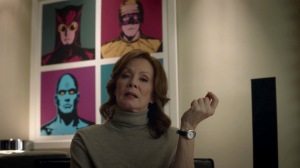
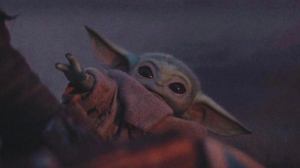


 That said, the 2019 Lion King is pretty darn flawless and sticks its landing, even if some are scratching their heads if it was needed at all. This film is a technological wonder, marrying the heart and horror of the animated film with a hyper-reality that makes all of the stakes disconcertingly real. It’s one thing to watch a James Earl Jones-voiced Mufasa trampled by a multi-colored two-dimensional stampede of wildebeest; it’s something else altogether to watch a photorealistic James Earl Jones-voiced Mufasa in the same harrowing circumstance.
That said, the 2019 Lion King is pretty darn flawless and sticks its landing, even if some are scratching their heads if it was needed at all. This film is a technological wonder, marrying the heart and horror of the animated film with a hyper-reality that makes all of the stakes disconcertingly real. It’s one thing to watch a James Earl Jones-voiced Mufasa trampled by a multi-colored two-dimensional stampede of wildebeest; it’s something else altogether to watch a photorealistic James Earl Jones-voiced Mufasa in the same harrowing circumstance.



 Reel Roy Reviews is now TWO books! You can purchase your copies by clicking
Reel Roy Reviews is now TWO books! You can purchase your copies by clicking ![Description: Film poster; Source: Wikipedia [linked]; Portion used: Film poster only; Low resolution? Sufficient resolution for illustration, but considerably lower resolution than original. Other information: Intellectual property by film studio. Non-free media use rationales: Non-free media use rationale - Article/review; Purpose of use: Used for purposes of critical commentary and illustration in an educational article about the film. The poster is used as the primary means of visual identification of this article topic. Replaceable? Protected by copyright, therefore a free use alternative won't exist.](https://reelroyreviews.com/wp-content/uploads/2013/02/beautiful-creatures.jpg?w=202)